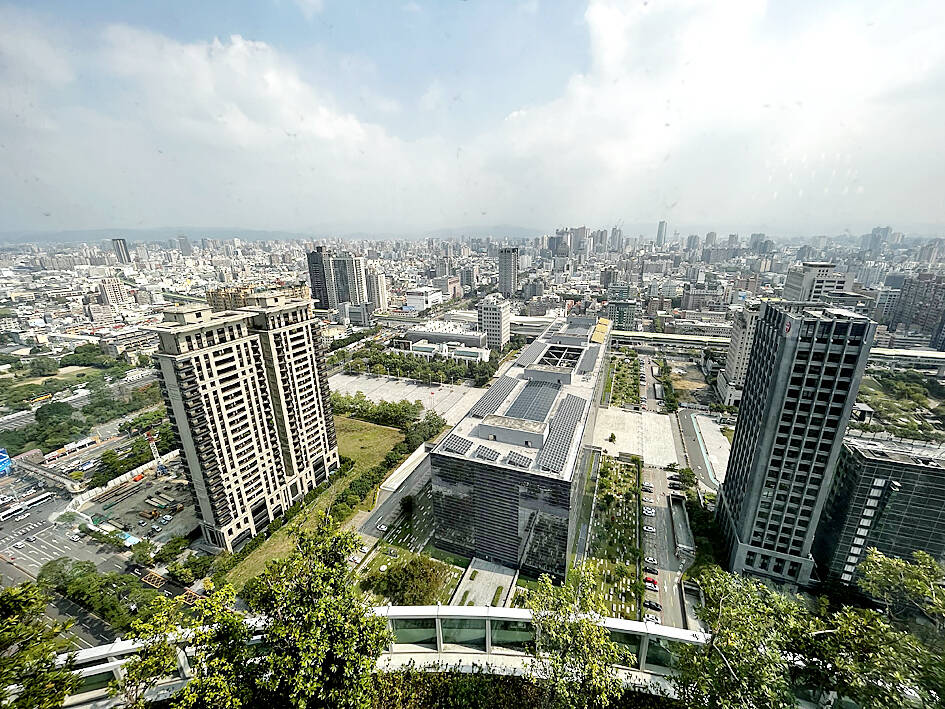Major property brokers reported a small monthly decline in housing transactions last month, but an annual drop of about 30 percent, dashing hopes of a high season, due to economic uncertainty and unfavorable legislation.
H&B Realty Co (住商不動產), Taiwan’s largest broker by the number of franchises, said deals last month declined 2.3 percent from November, which it blamed on an economic slowdown and interest rate hikes.
The decline was most evident in Taipei with a 10.9 percent drop, followed by New Taipei City, which fell 7.9 percent, and Taoyuan, which declined 5.7 percent, H&B Realty said.

Photo: Hsu Yi-ping, Taipei Times
The housing market in central and southern Taiwan fared more resilient, it said.
Taichung logged a 0.8 percent monthly drop, while deals in Tainan and Kaohsiung gained 9.2 percent and 1.5 percent respectively, H&B Realty said.
“Buying interest remains weak overall, even though the monthly figure in Tainan has increased for the past three months,” H&B chief researcher Jessica Hsu (徐佳馨) said.
Transactions in all six special municipalities slumped by double-digit percentages from a year earlier, Hsu said.
Transactions last year plummeted 46.1 percent annually in Kaohsiung, fell more than 30 percent in Taoyuan and Taipei, and retreated more than 20 percent in Tainan and Taichung, she said.
Evertrust Rehouse Co (永慶房屋), Taiwan’s largest broker by the number of offices, said its transactions last month rose 2 percent from November, but fell 32 percent from a year earlier.
People turned hesitant about property purchases after major economic indicators slipped into the contraction zone, while the central bank signaled further interest rates hikes if inflation remains high, Evertrust Rehouse deputy research head Chen Chin-ping (陳金萍) said.
Unease deepened after the legislature’s Internal Administration Committee last month approved bills that ban the transfer of presale housing contracts and subjects legal entities to prior approval before they can buy real estate, Chen said.
The unfavorable macro-environment is why transactions last year likely fell from 2021 and could shrink further this year, Chen said.
Price corrections for presale contracts would occur once the proposed bans take effect, driving investors off the market or have them lock their capital for a long period, Evertrust said.
Sinyi Realty Inc (信義房屋), Taiwan’s only listed broker, said that consideration periods became longer last month.
However, transactions of apartments priced NT$10 million to NT$25 million (US$325,648 to US$814,000) in Taipei held relatively stable, as well as those priced NT$10 million to NT$15 million in New Taipei City, Sinyi research manager Tseng Ching-der (曾進德) said.

‘SWASTICAR’: Tesla CEO Elon Musk’s close association with Donald Trump has prompted opponents to brand him a ‘Nazi’ and resulted in a dramatic drop in sales Demonstrators descended on Tesla Inc dealerships across the US, and in Europe and Canada on Saturday to protest company chief Elon Musk, who has amassed extraordinary power as a top adviser to US President Donald Trump. Waving signs with messages such as “Musk is stealing our money” and “Reclaim our country,” the protests largely took place peacefully following fiery episodes of vandalism on Tesla vehicles, dealerships and other facilities in recent weeks that US officials have denounced as terrorism. Hundreds rallied on Saturday outside the Tesla dealership in Manhattan. Some blasted Musk, the world’s richest man, while others demanded the shuttering of his

TIGHT-LIPPED: UMC said it had no merger plans at the moment, after Nikkei Asia reported that the firm and GlobalFoundries were considering restarting merger talks United Microelectronics Corp (UMC, 聯電), the world’s No. 4 contract chipmaker, yesterday launched a new US$5 billion 12-inch chip factory in Singapore as part of its latest effort to diversify its manufacturing footprint amid growing geopolitical risks. The new factory, adjacent to UMC’s existing Singapore fab in the Pasir Res Wafer Fab Park, is scheduled to enter volume production next year, utilizing mature 22-nanometer and 28-nanometer process technologies, UMC said in a statement. The company plans to invest US$5 billion during the first phase of the new fab, which would have an installed capacity of 30,000 12-inch wafers per month, it said. The

MULTIFACETED: A task force has analyzed possible scenarios and created responses to assist domestic industries in dealing with US tariffs, the economics minister said The Executive Yuan is tomorrow to announce countermeasures to US President Donald Trump’s planned reciprocal tariffs, although the details of the plan would not be made public until Monday next week, Minister of Economic Affairs J.W. Kuo (郭智輝) said yesterday. The Cabinet established an economic and trade task force in November last year to deal with US trade and tariff related issues, Kuo told reporters outside the legislature in Taipei. The task force has been analyzing and evaluating all kinds of scenarios to identify suitable responses and determine how best to assist domestic industries in managing the effects of Trump’s tariffs, he

Taiwan’s official purchasing managers’ index (PMI) last month rose 0.2 percentage points to 54.2, in a second consecutive month of expansion, thanks to front-loading demand intended to avoid potential US tariff hikes, the Chung-Hua Institution for Economic Research (CIER, 中華經濟研究院) said yesterday. While short-term demand appeared robust, uncertainties rose due to US President Donald Trump’s unpredictable trade policy, CIER president Lien Hsien-ming (連賢明) told a news conference in Taipei. Taiwan’s economy this year would be characterized by high-level fluctuations and the volatility would be wilder than most expect, Lien said Demand for electronics, particularly semiconductors, continues to benefit from US technology giants’ effort